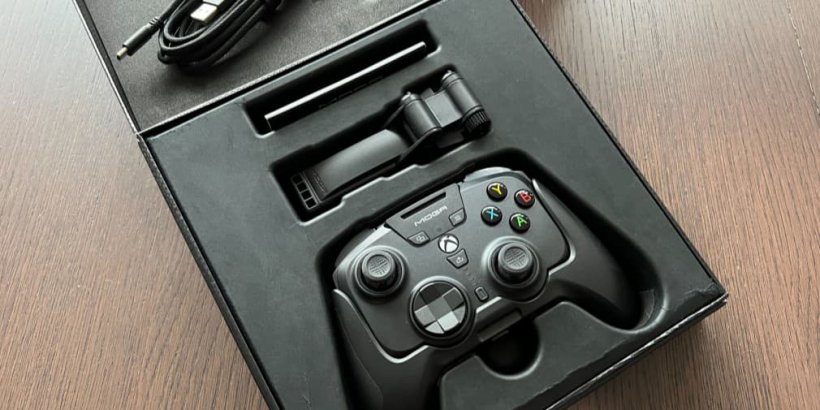
- A premium controller at a premium price, however, it's much more feature-rich than its price-mate the Backbone.
- A 2000mAh battery means a low battery is a rare issue.
- Four different piece combinations, including a micro-controller, however no iOS support.
You know that moment in action movies when somebody disassembles a gun in a matter of seconds and then reconstructs it? I think that might well have been what inspired PowerA's new MOGA XP-Ultra controller, which comes apart into three separate pieces to try to serve three separate needs.
I received a very nice display box through the mail, inside it was the MOGA XP-Ultra, a lengthy cable, a separate grip for adapting it to hold a phone, a small instructions book and a voucher for a month's free membership to Xbox Game Pass Ultimate. Game Pass Ultimate is, after all, the hottest of things when it comes to third-party controllers at the moment, and for good reason... it runs seamlessly on mobile, PC and Xbox and features a great offering of games and, if Microsoft gets their way, it'll run on everything from coffee machines to PS5s.

The thing is, Xbox Game Pass adoption isn't perhaps the most dynamic market to focus on at the moment. There's a massive number of users on the subscription model, and — from what I've gathered from talking to people — the majority of them are currently using it on just one system. Is saying you can play XGP on your mobile enough to get somebody who doesn't play XGP to buy a controller? Perhaps not. Anyway, marketing messages aside, let's talk about the MOGA XP-Ultra, which is actually a great controller.
But, before we get into the nitty-gritty, let's talk about that Microsoft connection one more time. The MOGA XP-Ultra's killer feature for most won't be the modular design — it'll be the fact that this is the first time the Xbox Wireless Protocol has been used outside of their own devices. That means you won't need a silly dongle (perhaps a perfect insult) or to be wired in to get the controller to interface with an Xbox with the reaction time you get from the official controller. That said, this doesn't affect us here on mobile except for those of us (of which I'm one) who split their time between multiple platforms.
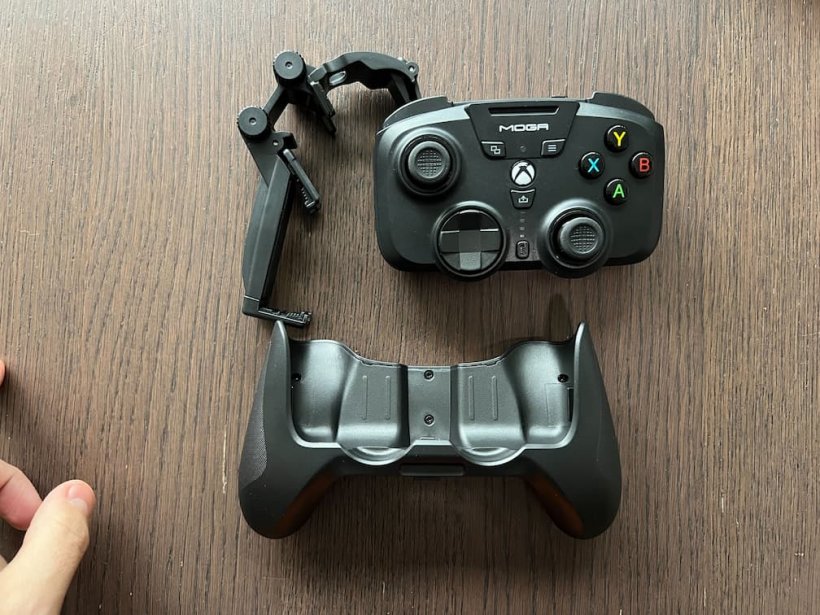
Somewhere along the way, as well, iPhone and iOS compatibility has gone out the window. Despite it connecting to Android phones via Bluetooth, it simply won't pair with them. This seems a little bizarre, and I can only assume that it is a result of strategic partnerships... but, that doesn't benefit the people who will buy the controller.
A final gripe, because I'm starting to convince myself that this handset isn't actually as good as it is, would be that there was a missed opportunity on the (otherwise fantastic) mobile grip attachment. Once the grip is fitted, it clips around where you'd insert the USB-C cable to charge it. While there's an assumption that you'd play mobile games on the go, it does mean that if you do find yourself charging at home there's a chance you'd have a cable wedged between the grip below the controller. It's not as well positioned as it could be and misses a clear chance to feature a split-head USB-C cable that could charge both the controller and (most) phones.
That brings me to the positives though. After an initial charge I've had the controller running next to me for a little over 15 hours and it shows absolutely no sign of running low yet. That's a result of the 2000mAh battery inside of it, which is absolute decadence for a controller and ensures that you're really not going to accidentally run out of charge.
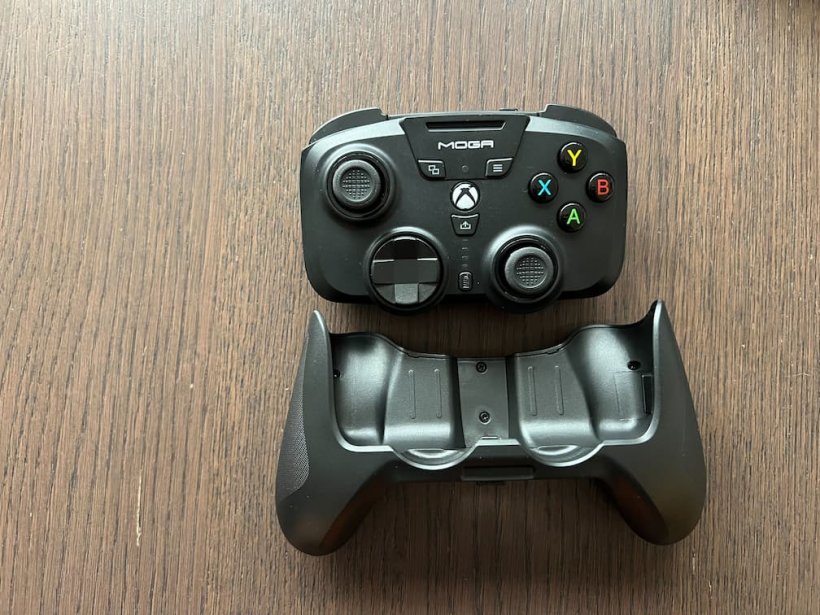
Everything does clip together well, there's a rocker which clips in the grip on the back, pulling the other end of the rocker and the front-side part of the grip into place. Two joints, which can be fastened, as well as a hinged lower grip and a spring-loaded top grip, mean that this feels secure despite its flexibility.
The main controller itself, a small malformed rectangular affair that feels heavy and very alien. The absence of grips, but the presence of bumpers and triggers means there's no natural feel to this — it feels like a cross between an 8bitDo's NES-style form factor when you ignore the shoulders, and a legless, gripless console controller when you try and put your fingers on the shoulders.
The only solution, from what I can tell, is pulling the base of the controller close to your palms, but that makes certain parts inaccessible. This form is probably great for early-stage emulation, or games that don't rely on shoulders (like shooters or racers) however, I'm not sure about beyond that. Add the grips on, though, and it's great. All buttons are accessible, and you gain three more buttons.
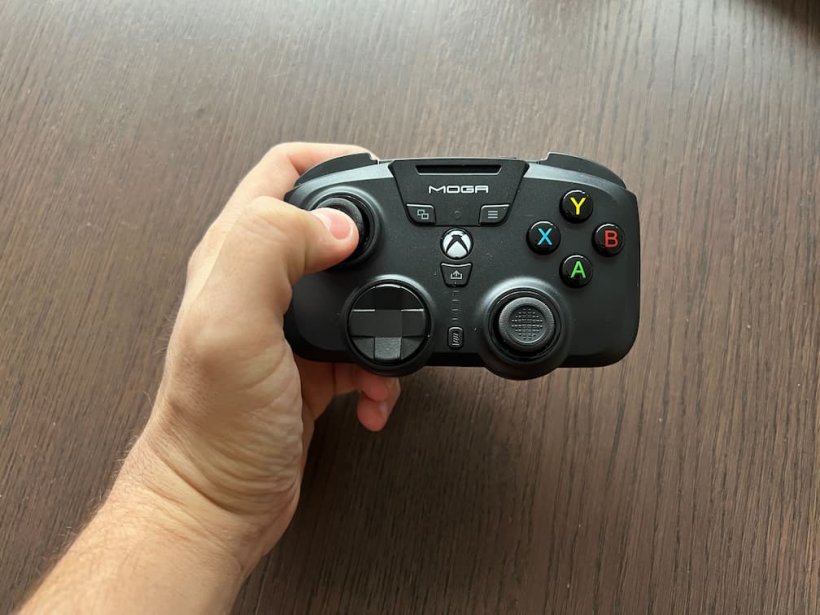
Let's talk about the components now. The analogue sticks are light, but have a great grip on the top of them; not that you're likely to take your thumbs off them, but they spring back well, unlike some third-party controllers. The D-pad is of the same type as modern Xbox ones, with a one-piece, with directions raised, however, it lacks that satisfying clicking noise that they have, although the raised shoulder gives it a pleasing height that others lack.
Its buttons feel springy and show no sign of catching or weakening after heavy usage. The bumpers and rear buttons are the same, although that can't be said of the triggers which feel light and make a noise that infers they're hollow. That emptiness infers a cheapness (even if it's not there) and I'm surprised that they don't feel sturdier considering the price point of the controller.
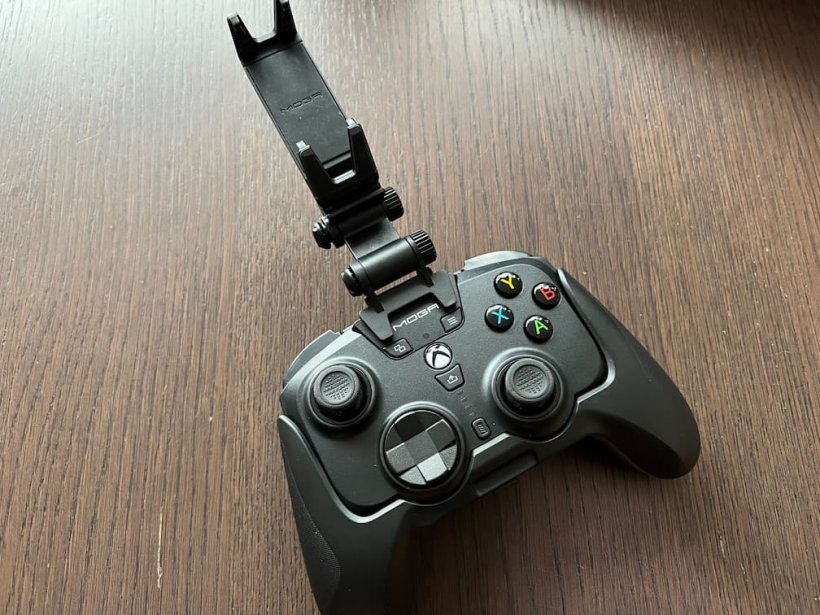
The controller, on the whole, does feel sturdy and well-made though. I love the delicate textured grip on the triggers, tops of the analogue sticks and the grips. The rubberised rest for your phone also feels like a smart design choice, and the two-pronged nature of the clamp (and its teeth) is a clever design choice that caters for the varying sizes and styles of phones out there.
It's a premium product, with premium parts (including that massive battery and rumbles in both formats of the handset) and that does mean it has a premium price. It's become increasingly obvious, through the rise of eSports, that the tech that you're using when you play is as important as the specs of the car in F1 — if you want the best, then £110 is probably a cost you're willing to play, and it's not much more than the phone-gripping Backbone.
MOGA XP-Ultra review - "Interesting modular design and great grip"

